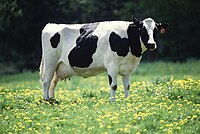
Photo from wikipedia
Abstract Background and Aim: Subclinical mastitis (SCM) is an economically important disease for dairy cattle worldwide; therefore, regular screening is imperative to detect SCM at an early stage so as… Click to show full abstract
Abstract Background and Aim: Subclinical mastitis (SCM) is an economically important disease for dairy cattle worldwide; therefore, regular screening is imperative to detect SCM at an early stage so as to control it. The study was conducted to compare the test characteristics of sodium lauryl sulfate (SLS) as a test reagent to detect SCM in dairy cows. Materials and Methods: First, 106 milk samples of dairy cows were subjected to available indirect screening tests (white side test [WST], surf field mastitis test, Leucocytest, and Immucell) considering somatic cell count (SCC) as gold standard test. Then 273 milk samples were allowed to react with different concentrations of SLS with or without sodium hydroxide (NaOH) and indicators (bromothymol blue [BTB] and bromocresol purple [BCP]). Results: SLS with or without NaOH yielded best reaction with the milk samples similar to Leucocytest. It was observed that the reaction of milk samples with SLS added with indicators (BTB and BCP) was easier to visualize than without indicators. SLS 3%+NaOH 1.5% with BTB and SLS 2% with BCP had high sensitivity, specificity, and substantial agreement with SCC. The area under the receiver operating characteristics curve of SLS 2% with BCP and SLS 3%+NaOH 1.5% with BTB was 0.917 and 0.875, respectively. Conclusion: It may be concluded that SLS 3%+NaOH 1.5% with BTB and SLS 2% with BCP may be the potential reagents for the development of an effective cow-side test to detect SCM, as the main ingredient SLS is considerably cheap and readily available in developing countries.
Journal Title: Veterinary World
Year Published: 2021
Link to full text (if available)
Share on Social Media: Sign Up to like & get
recommendations!